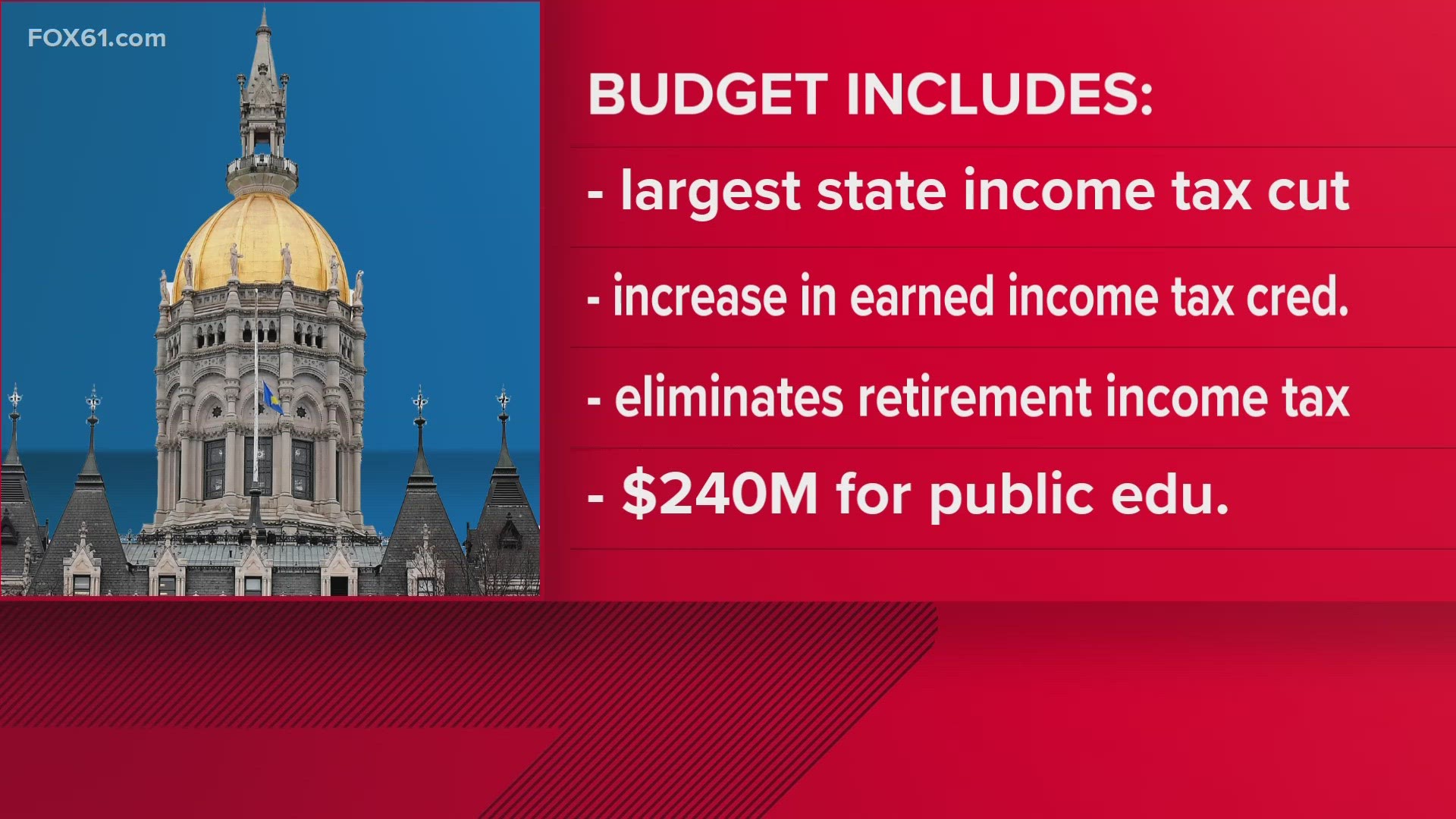HARTFORD, Conn. — The Connecticut House of Representatives has passed a $51.1 billion, two-year state budget overnight into Tuesday morning. The final vote count was 139 for the budget and 12 opposing.
The budget now heads to the State Senate for a vote. From there, the final step is for Gov. Ned Lamont to sign.
First proposed by Lamont, the planned tax reduction is predicted to benefit approximately 1.1 million of the state’s 1.7 million tax filers by permanently lowering marginal rates for the first time since 1996. It's being billed as the largest reduction since the tax was first implemented in 1991.
“This budget will deliver the largest personal income tax cut in the state’s history,” Lamont said in a written statement issued before the vote. “This is not a temporary tax cut – it is designed to be sustainable for years to come.”
He urged lawmakers to support the package, which increases spending by about 7.5% over two years. Lamont has previously noted the state’s fiscal health has improved to the point where it can afford to provide permanent tax relief. The plan lowers the 5% marginal income tax rate to 4.5% and the 3% rate to 2% for the income year 2024.
The plan also increases the income tax credit for low-income working families, benefitting about 211,000 filers, and freezes scheduled increases in the state diesel tax.
Republican House Minority Leader Vincent Candelora welcomed the tax cut, even though the GOP had wanted more tax relief, including for the business community.
“Of course we’re going to say it never goes far enough because Connecticut is a very unaffordable state,” he said. “But it makes an effort. It’s recognizing the middle class needs relief.”
The two-year tax-and-spending package also boosts state aid for local school districts; funds the “baby bonds” program that sets aside up to $3,200 for low-income infants; increases rates for ambulance services; expands an anti-gun violence program to two more cities; increases pay for inmates; and includes additional funding for nonprofit social service agencies and state colleges and universities, even though advocates contend it's not enough considering the state's resources.
“Look, do I wish we could have spent a couple $100 million more? Yes, I do. I think that's where our caucus was. We thought there were ways to do it. ... But it didn't happen,” said Democratic House Speaker Matthew Ritter, who contends he's still happy with the package. There was a disagreement between legislative Democrats and Lamont over whether to spend approximately $200 million above and beyond the state's cap on spending.
Last week, state Comptroller Sean Scanlon projected the current fiscal year, which ends June 30, will end with a $1.6 billion budget surplus, an increase of $16.1 million from May.
“A 2.5 percent increase is insufficient and the state has the ability to do more for hundreds of community nonprofits and the 500,000 people they serve,” said Gian-Carl Casa, president and CEO of CT Community Nonprofit Alliance, which represents agencies that provide services ranging from mental health and substance abuse treatment to homeless shelters and prison reentry programs. He said the budget will make it more difficult to hire workers, force programs to close and create longer waiting lists for services.
There's also disappointment over how much is set aside for the state's new early voting program, which is expected to affect general elections, primaries and special elections held on or after Jan. 1, 2024. Democratic Secretary of the State Stephanie Thomas said the budget plan “shortchanges” voters and funds “roughly half of the bare minimum that municipalities need” to successfully implement the program. She vowed to continue to seek additional funding next fiscal year.
Candelora predicted a lot of Monday's debate will focus on non-budgetary language included the budget bill. He gave the example of a provision concerning federally qualified health centers that he said might violate federal law.
“It sounds technical, but the reality is that there’s a push to pass a law that’s against federal law, and that’s dangerous,” he said.
The new budget, if signed ultimately into law by Lamont, will take effect on July 1.
---
Have a story idea or something on your mind you want to share? We want to hear from you! Email us at newstips@fox61.com
----
HERE ARE MORE WAYS TO GET FOX61 NEWS
Download the FOX61 News APP
iTunes: Click here to download
Google Play: Click here to download
Stream Live on ROKU: Add the channel from the ROKU store or by searching FOX61.
Steam Live on FIRE TV: Search ‘FOX61’ and click ‘Get’ to download.

